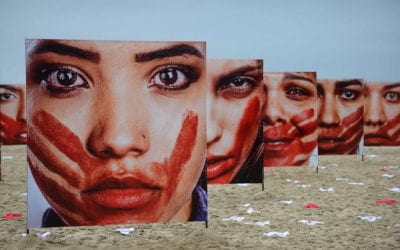Beyond Violence
Sexual and Reproductive Rights
Sitting across from her, I wondered how, after the 23 years she had lived, she still looked so young. Her fragile frame had survived the deaths of her mother, father, brother, and cousin. In response to my questions, she gave a nod, a shrug of the shoulders, and occasional words allowing the details of her story to slowly unfold. In a community center in Mare, a poor community just one hour’s bus ride from the photo-famous beaches of Rio de Janeiro, I listen to how her sexual and reproductive health choices were dictated by the reality of living in a slum, in this favela. A Portuguese word often understood without translation, favelas are infamous for their violence, but few understand how completely the presence of such violence determines daily decisions and interactions.
For example, this young woman was forced to have sex at 14, didn’t use a condom then, and hasn’t used one since. But she doesn’t want to get pregnant. “Have you considered other types of contraceptives?” I ask. Then discussing the options she knows are available at the community health clinic, she answers me with another silent shrug. Continuing on to other aspects of her sexual and reproductive health, her responses consistently relay the highest level of risk. Without prompting, she concludes the interview by telling me how each person in her family died. Violence, largely in connection to drug trafficking, had claimed each one.
I was hesitant to ask my final question, “Where do you see yourself in five years?” Having glimpsed at the roots of her self-destructive behavior, I assumed daily survival would be enough for her. “To go to school,” she replied. She paused, looking me in the eye, straight, for just a moment before repeating, “I want to go back to school.” Her desire to return to school made her just like every other young woman I spoke with from Mare: they all, regardless of their circumstances, kept hope, kept believing, that education would be their chance at a better life.
That was my final interview. With the support of the David Rockefeller Center for Latin American Studies, I was able to return to Brazil for two weeks during the month of January to conduct qualitative research for my Master’s thesis that focuses on the sexual and reproductive health of young women in Mare. As the core of my thesis, I am analyzing the baseline interviews for Project M. A program developed by Instituto Promundo, one of Brazil’s leading NGOs, Project M explores the role of gender and power in personal relationships, providing an immediate opportunity to be associated with the intervention in the spread of HIV /AID S, in addition to improving the overall quality of life by empowering these same youth to choose healthy lifestyle behaviors. Trying to add context to the quantitative analysis, I conducted the interviews in an effort to connect the words and stories of these women to the statistics.
I will try, through the analysis of my thesis, to explain the difficulties these women face to make healthier lifestyle decisions. Using both quantitative and qualitative data to provide a snapshot of their sexual and reproductive lives, it is clear that violence is a consistent theme throughout their lives. Not until I provide a more complete picture of their reality, can one begin to understand just how inspiring their spirits are as they continue to dream and persevere.
Spring 2007, Volume VI, Number 3
Sarah MacCarthy is a Masters of Science Candidate, 2007, in the Department of Population and International Health, Harvard School of Public Health.
Related Articles
Violence Against Women in Brazil: Public Policy and its Implementation in Rural Areas
English + Português
Eight o’clock in the evening—it’s time to gather and watch the national news program in Rio de Janeiro, Brazil.
2022: Uma Encruzilhada Histórica
English + Português
Este segundo turno da eleição 2022 no Brasil é um embate histórico entre visões de mundo. Entre concepções de vida e seus sistemas de valores. Você vai eleger (etimologia: escolher) em que mundo seria concebível viver.
Editor’s Letter: Brazil
Brazil is different. Brazil is huge. Brazil is colorful. Brazil is magic. In Brazil, the people speak Portuguese instead of Spanish.




